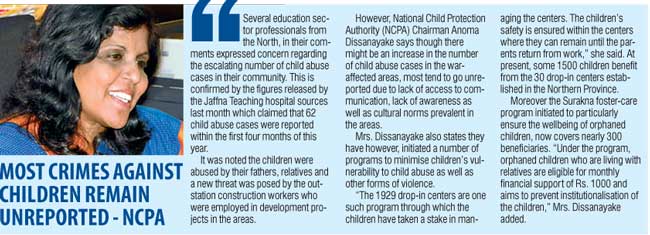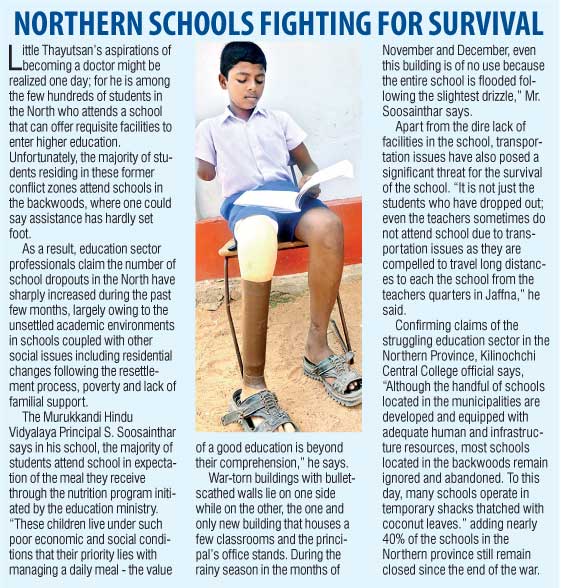Reply To:
Name - Reply Comment
 With a few books clutched in his left hand, Jayasankar Thayutsan walks heavily, dragging his right foot, trying to keep pace with his classmates running towards the playground. The stump of his amputated right arm twists as he attempts to quicken his pace. But instead of joining his friends at play, Thayutsan retires into the shade of a tree. The prosthetic limb that is in place of his right leg does not bend as he sits - so he stretches it forward.
With a few books clutched in his left hand, Jayasankar Thayutsan walks heavily, dragging his right foot, trying to keep pace with his classmates running towards the playground. The stump of his amputated right arm twists as he attempts to quicken his pace. But instead of joining his friends at play, Thayutsan retires into the shade of a tree. The prosthetic limb that is in place of his right leg does not bend as he sits - so he stretches it forward.
 This 14-year-old boy had lost his right arm and leg about four years ago, caught in the midst of a shell attack. “I was at the Government Agent’s office with my aunt that day, waiting for my turn to collect our share of provisions provided by the government. I remember hearing a loud blast and when I regained consciousness, I found myself on a hospital bed,” he says, describing the fragments of his memory he is able to recollect, of that dark day.
This 14-year-old boy had lost his right arm and leg about four years ago, caught in the midst of a shell attack. “I was at the Government Agent’s office with my aunt that day, waiting for my turn to collect our share of provisions provided by the government. I remember hearing a loud blast and when I regained consciousness, I found myself on a hospital bed,” he says, describing the fragments of his memory he is able to recollect, of that dark day.
Thayutsan is one of over a million children who were subjugated to the atrocities of the 30 year long conflict that ravaged this country. According to an estimate by the UNICEF in the early 2000s, nearly 900,000 children in the Northeast were gravely affected by the war due to being recruited as child soldiers by the LTTE as well as due to lack of education, food, shelter or by direct injury. At present, nearly a decade later, it is probable the numbers would have escalated, totalling children in the Southern parts of the country who were affected by the conflict as well.
.jpg) An aspiring doctor, Thayutsan’s teachers vouch for his brilliant performance in academic activities. Subjects such as science and mathematics that an average child would find dull, or perhaps even challenging, are Thayutsan’s favorites. Thayutsan lives in Udayanagar, Kilinochchi, with his three siblings and his widowed mother who is employed as a tailor to make ends meet. Unaffected by his physical ailments, this little boy reaches for the sky, resolute to make his mother proud one day. “My mother is determined to give us a good education and I intend to realise her dreams,” he says confidently.
An aspiring doctor, Thayutsan’s teachers vouch for his brilliant performance in academic activities. Subjects such as science and mathematics that an average child would find dull, or perhaps even challenging, are Thayutsan’s favorites. Thayutsan lives in Udayanagar, Kilinochchi, with his three siblings and his widowed mother who is employed as a tailor to make ends meet. Unaffected by his physical ailments, this little boy reaches for the sky, resolute to make his mother proud one day. “My mother is determined to give us a good education and I intend to realise her dreams,” he says confidently.
The only request Thayutsan made, is for assistance to procure a prosthetic limb in place of his amputated right arm. “My mother is not able to collect adequate cash for an expense as I have been told it would be quite costly. I would be grateful if assistance can be provided for me to obtain an artificial arm, so that I would not have to be a dependant – then, I’d be able to realise my dreams on my own,” he says.
Assistance for the disabled
Thayutsan is not alone in his plight. A 2009 UNICEF supported study on General Health and Injury in the Jaffna district, conducted in partnership with the Centre of Disease Control and Prevention has revealed the prevalence rate of all forms of disabilities among children including war related, accident related and natural disabilities.

UNICEF External Relations Communications Officer Suzanne Davey quoting the 2009 UNICEF report states a significant necessity lies for physical rehabilitation services dedicated for disabled children, as their speed of growth requires the regular changing of prosthetic devices. “These children would also require other forms of assistance including skill trainings and community-inclusion programmes to ensure the smooth integration and their participation in the communities,” she said while adding psychosocial counselling services should also be in place to help children cope and overcome their impairments.
Overcoming the mind’s darkness
16-year-old Archana* from Kilinochchi is another young victim of the ethnic strife in the country. Her voice lost, she has not uttered a single word for the past six years since the day she saw the remains of her father’s dismembered body following a blast near her house. Her mother, desperate to get her child back to normalcy, has been taking Archana to various hospitals in the area. It has been diagnosed she is not responding as a result of the shock. In spite of the many treatments and therapies she has undergone, it seems Archana still struggles with her dark memories .
Although not all children residing in these war affected zones would manifest their trauma and psychological conflicts in the likes of Archana, it is given that witnessing atrocities in such a graphic-scale would leave deep scars in their minds. The Kilinochchi district hospital psychotherapy unit official who wished to remain anonymous said, the most common psychological ailment manifesting in the children are somatisation disorders (unexplained physical ailments) as well as Post Traumatic Stress Disorder (PTSD), depression, paranoia as well as anxiety related issues.
 “The mayhem witnessed and experienced by these children has caused them to manifest their psychological conflicts in various manners. However, their healing has taken a prolonged period mainly due to lack of familial support,’ the official states adding, “Most families in these areas are disorganised – the children either lack the father or the mother or both parents. Most parents, who are living, have not assumed the relevant duties of their roles as the father or the mother, mostly owing to the psychological trauma they too have undergone during the conflict period. Hence the family units are still unsettled, even following three years into the post-conflict era.”
“The mayhem witnessed and experienced by these children has caused them to manifest their psychological conflicts in various manners. However, their healing has taken a prolonged period mainly due to lack of familial support,’ the official states adding, “Most families in these areas are disorganised – the children either lack the father or the mother or both parents. Most parents, who are living, have not assumed the relevant duties of their roles as the father or the mother, mostly owing to the psychological trauma they too have undergone during the conflict period. Hence the family units are still unsettled, even following three years into the post-conflict era.”
The official also mentioned the prevalent alcohol addiction among adults as a major contributing factor towards unsettled family units. “Over 50 per cent of the adults are alcoholics; this reason coupled with poverty and other social issues have caused the destruction of family units, largely impacting the slow paced psychological recovery of children.”
A long way to go –Save the children
Commenting on the plight of children affected by the war in the North, Save the Children Director Member Service and Advocacy - Menaca Calyaneratne strikes a responsive chord with the issues highlighted concerning the plight of war-affected children. She emphasises on the fact that there is still a long way to go with regard to the full recovery of children.
Ms. Calyaneratne highlights the importance of providing attention on rebuilding schools and restoring education as well as ensuring the psychological wellbeing of children and adults, in the areas. In her statement, she also points out the importance of streamlining programmes focused particularly on orphaned children, in order to ensure the children are cared for in child-friendly environments. “By the end of the conflict, there was 46 percent malnutrition among children according to rough findings by Save The Children. Families need to have steady incomes in order to feed their children. However, almost weekly we hear of people attempting illegal migration which indicates a lack of opportunities for people to make a living in these areas. Therefore, attention should be paid for the welfare of the adults as well so that their effects would trickle down to the wellbeing of the children,” she added. In present times, where lessons learnt through this bloody conflict are spoken of in such hype, implementation of strong policies that are practically effective to assist war affected children should be placed at the pinnacle of the reconciliation agendas. Instead, it was disappointing to repetitively discover that official, segregated statistics that reflect the condition of war-affected children in the post-conflict period, still do not exist
It is a grave weakness, particularly of the state sector authorities, as it would definitely affect their efforts to reach out and provide assistance. Hence, it is no wonder to discover that genuine efforts, which would ensure a brighter future for these children are still at a lax pace, not to mention child rights violations that results through such negligence.
Pics by Samantha Perera